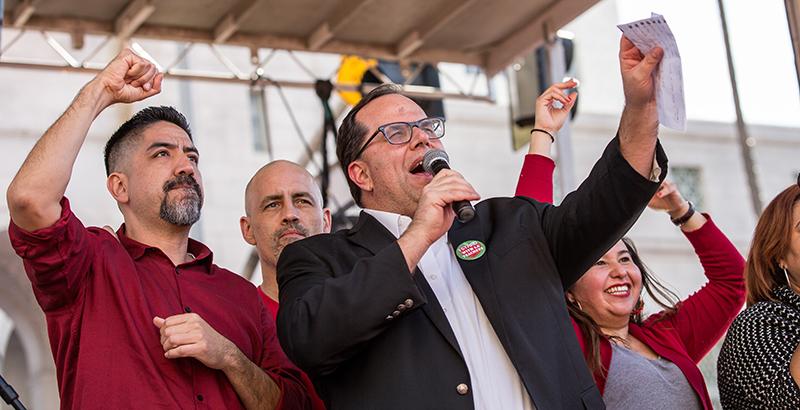Bertelli: Los Angeles School District Board Retreats From Fiscal Challenge Again — and Teachers Union Boss May Be the Big Winner

Nearly a year ago, the Los Angeles Unified School District Board of Directors voted to approve a new three-year agreement with United Teachers Los Angeles and seven other district bargaining units, extending union members’ ability to earn free lifetime health, dental, and vision care for themselves, their spouses, and their dependents. Long acknowledged as one of the primary causes of the district’s persistent budget woes, these incredibly generous benefits were approved in a divided vote, 4-2, with board president Mónica García voting in favor but acknowledging the district could not afford the agreement and vowing to get tougher in future negotiations. Board member Nick Melvoin voted against the agreement and issued dire warnings about continuing to add to the district’s staggering $15 billion unfunded liability.
Fast-forward 11 months, and the board members, again, are going to be asked to vote on an expensive contract that locks in future liabilities that the district can’t afford. The tentative agreement between the district and the teachers union that ended the recent six-day strike adds to the payroll new teachers, nurses, counselors, and community schools coordinators, all of whom will qualify for the lifetime benefits approved last February.
Though there is no plan for funding the hundreds of millions of dollars in new salaries and benefits, there is no reason to believe the board will make good on its promise of better fiscal responsibility. Superintendent Austin Beutner would not have agreed to a deal that could not pass muster with his board. So, as in February, there will be a lot of talk about getting the district’s fiscal house in order, followed by a vote to heap more debt and financial obligations on a system already teetering on the brink of insolvency.
The district’s board members (current and past) have made head-scratchingly bad decisions forever, it seems. Somehow, years of declining enrollment have corresponded with the creation of more district schools, an increase in administrative positions, and a loss of teaching positions. There is no evidence the district has a coherent plan for administrative staffing at the central office or the school sites. For the third year in a row, the district has counted among its “cost savings” the ability to save $35 million by getting the state to not impose fines for having too many administrators. Every neutral fiscal observer has expressed serious doubts about the district’s ability to meet its current financial obligations without significant future cuts or revenue increases.
Into this mess steps Alex Caputo-Pearl, who ran for union president on a strike platform and openly admitted that his plan was to foster a “state crisis” to protect his members’ benefits. Mission accomplished.
Caputo-Pearl led a strike that cost his members millions in lost wages, cost the district approximately $150 million in lost revenue it can’t afford ,and committed the district to obligations it has no concrete plans to pay for. Hundreds of thousands of students lost six days of learning time, and families were faced with the choice of sending their kids to school that was little more than day care or miss work. A district in desperate need of Superman got Captain Chaos instead.
Caputo-Pearl hammered away at the district with the lie that it was actually in fine financial shape and could afford to pay more to current members and hire a lot more right now. He sold his members on the idea that they were entitled to a bigger raise than the other unions, and that he was going to get it for them.
At the end of the day, the strike Caputo-Pearl led yielded many teachers nothing more than the pay raises they had been offered before — the same 6 percent the other unions received — since the additional promise of incremental class size reduction applies only to certain subjects and schools and leaves out special education classes altogether. The union’s Facebook page was inundated with unhappy union members who thought they were spending a week on strike to fundamentally change the district, only to see modest differences when the details of the deal began to emerge. Supporters of the settlement openly questioned why a strike was necessary for the modest achievements it brought. For a huge district drowning in red ink, however, even small increases in short- and long-term obligations can bring about dire consequences.
Yet Caputo-Pearl, who most speculate has his eyes set on a state or national union leadership position, will be the ultimate winner in this whole sad affair. What better political platform to run on than to be the union leader who bullied a broke district into hiring more union members in a post-Janus world? The district is in desperate need of more funds. If it gets more money than needed to meet its current financial obligations, then Caputo-Pearl succeeded in locking that surplus into union priorities. It was a stunning display of bare-knuckled political power.
It will also likely mark another retreat for the district board from its own promises to “do better” to improve the district’s financial condition. The euphoria and credit-taking for this deal will soon meet the reality of the district’s still-tenuous financial position. If it gets worse, there is real risk the district could lose the ability to govern itself. Who will want to take credit then?
Chris Bertelli is the founder of Bertelli Public Affairs, an education public affairs consultancy based in Sacramento. He specializes in working with clients focused on improving educational equity in California public schools.
Get stories like these delivered straight to your inbox. Sign up for The 74 Newsletter

;)